Poor Oral Health: A Threat to General Health in Elderly Patients
VerifiedAdded on 2020/04/07
|18
|4734
|428
Essay
AI Summary
This essay explores the significant impact of poor oral health on the overall well-being of elderly patients. It delves into the various health problems associated with poor oral hygiene, including dementia, weight loss, cardiovascular disorders, diabetes mellitus, kidney diseases, respiratory diseases, stroke, stomach ulcers, and even cancer. The essay highlights the key factors contributing to oral health decline in geriatrics, such as weakened defense systems, loss of teeth, and the prevalence of chronic diseases. It emphasizes the importance of preventive measures like regular dental visits and proper oral hygiene to mitigate these risks. Furthermore, the essay examines the obstacles in providing adequate oral care to the elderly and underscores the benefits of protective dentistry. It concludes by reinforcing the crucial link between oral health and general health, emphasizing the need for comprehensive care to enhance the quality of life for older adults. The essay provides valuable insights into the bidirectional relationship between oral health and systemic diseases, advocating for proactive dental care to prevent and manage various health complications in the elderly population.
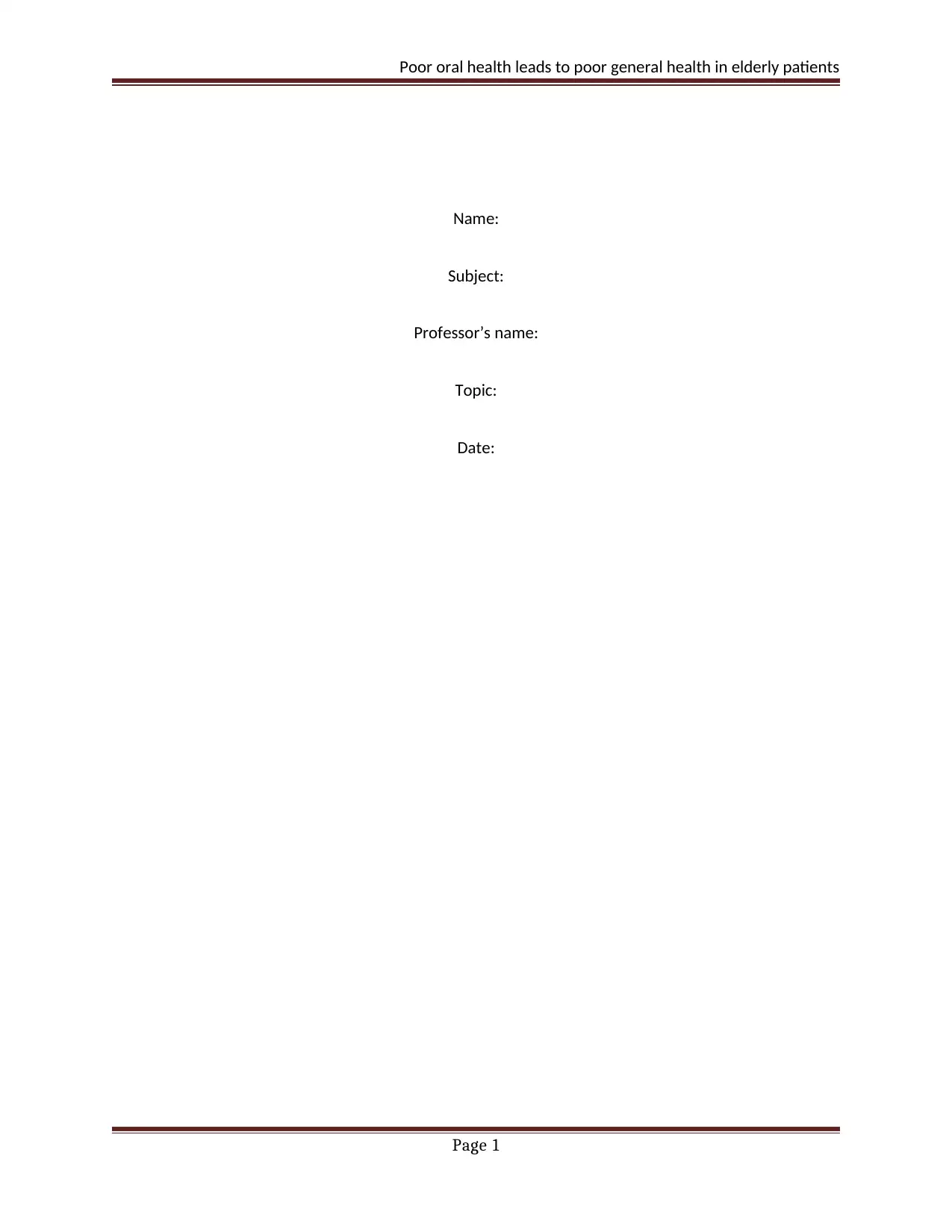
Poor oral health leads to poor general health in elderly patients
Name:
Subject:
Professor’s name:
Topic:
Date:
Page 1
Name:
Subject:
Professor’s name:
Topic:
Date:
Page 1
Paraphrase This Document
Need a fresh take? Get an instant paraphrase of this document with our AI Paraphraser
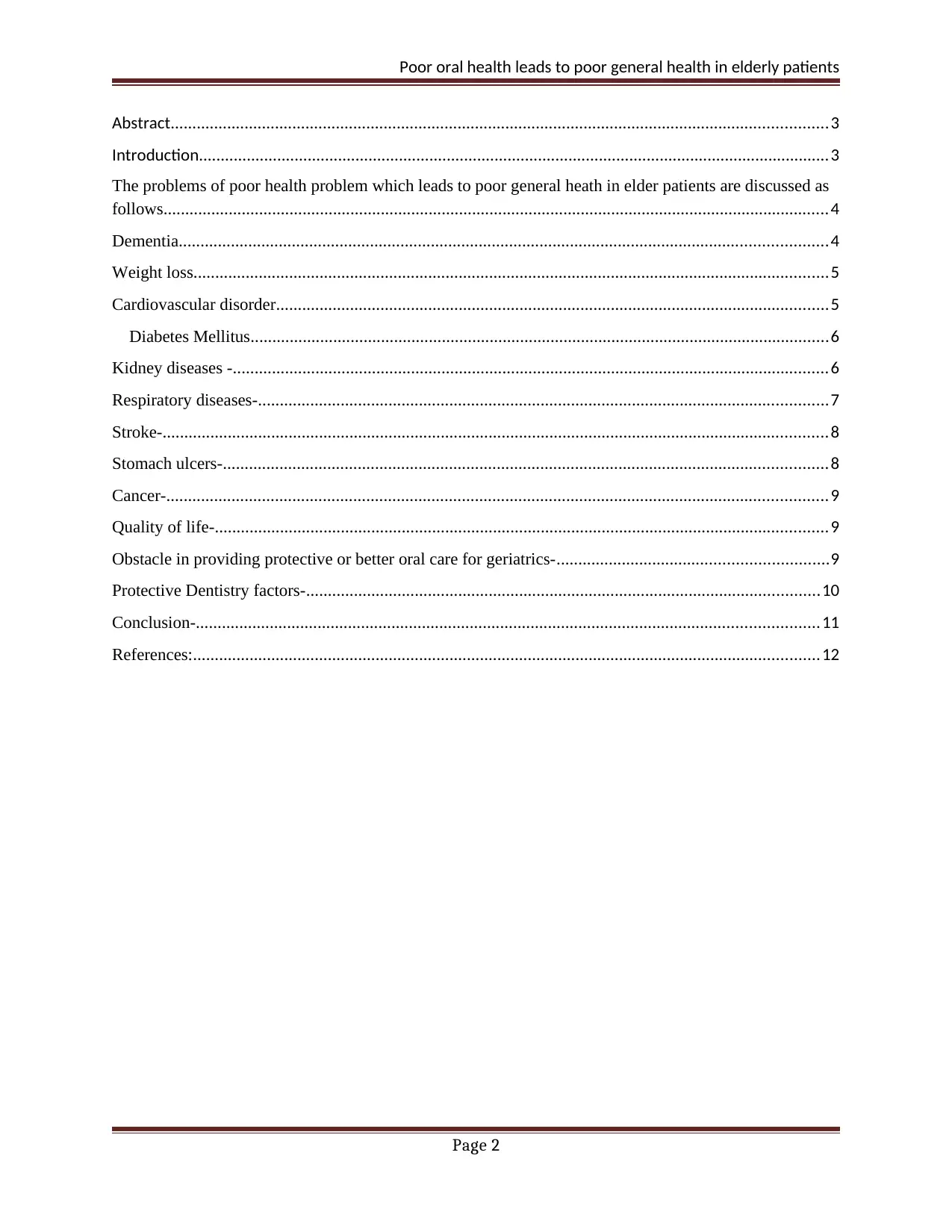
Poor oral health leads to poor general health in elderly patients
Abstract.......................................................................................................................................................3
Introduction.................................................................................................................................................3
The problems of poor health problem which leads to poor general heath in elder patients are discussed as
follows.........................................................................................................................................................4
Dementia.....................................................................................................................................................4
Weight loss..................................................................................................................................................5
Cardiovascular disorder...............................................................................................................................5
Diabetes Mellitus.....................................................................................................................................6
Kidney diseases -.........................................................................................................................................6
Respiratory diseases-...................................................................................................................................7
Stroke-.........................................................................................................................................................8
Stomach ulcers-...........................................................................................................................................8
Cancer-........................................................................................................................................................9
Quality of life-.............................................................................................................................................9
Obstacle in providing protective or better oral care for geriatrics-..............................................................9
Protective Dentistry factors-......................................................................................................................10
Conclusion-...............................................................................................................................................11
References:................................................................................................................................................12
Page 2
Abstract.......................................................................................................................................................3
Introduction.................................................................................................................................................3
The problems of poor health problem which leads to poor general heath in elder patients are discussed as
follows.........................................................................................................................................................4
Dementia.....................................................................................................................................................4
Weight loss..................................................................................................................................................5
Cardiovascular disorder...............................................................................................................................5
Diabetes Mellitus.....................................................................................................................................6
Kidney diseases -.........................................................................................................................................6
Respiratory diseases-...................................................................................................................................7
Stroke-.........................................................................................................................................................8
Stomach ulcers-...........................................................................................................................................8
Cancer-........................................................................................................................................................9
Quality of life-.............................................................................................................................................9
Obstacle in providing protective or better oral care for geriatrics-..............................................................9
Protective Dentistry factors-......................................................................................................................10
Conclusion-...............................................................................................................................................11
References:................................................................................................................................................12
Page 2
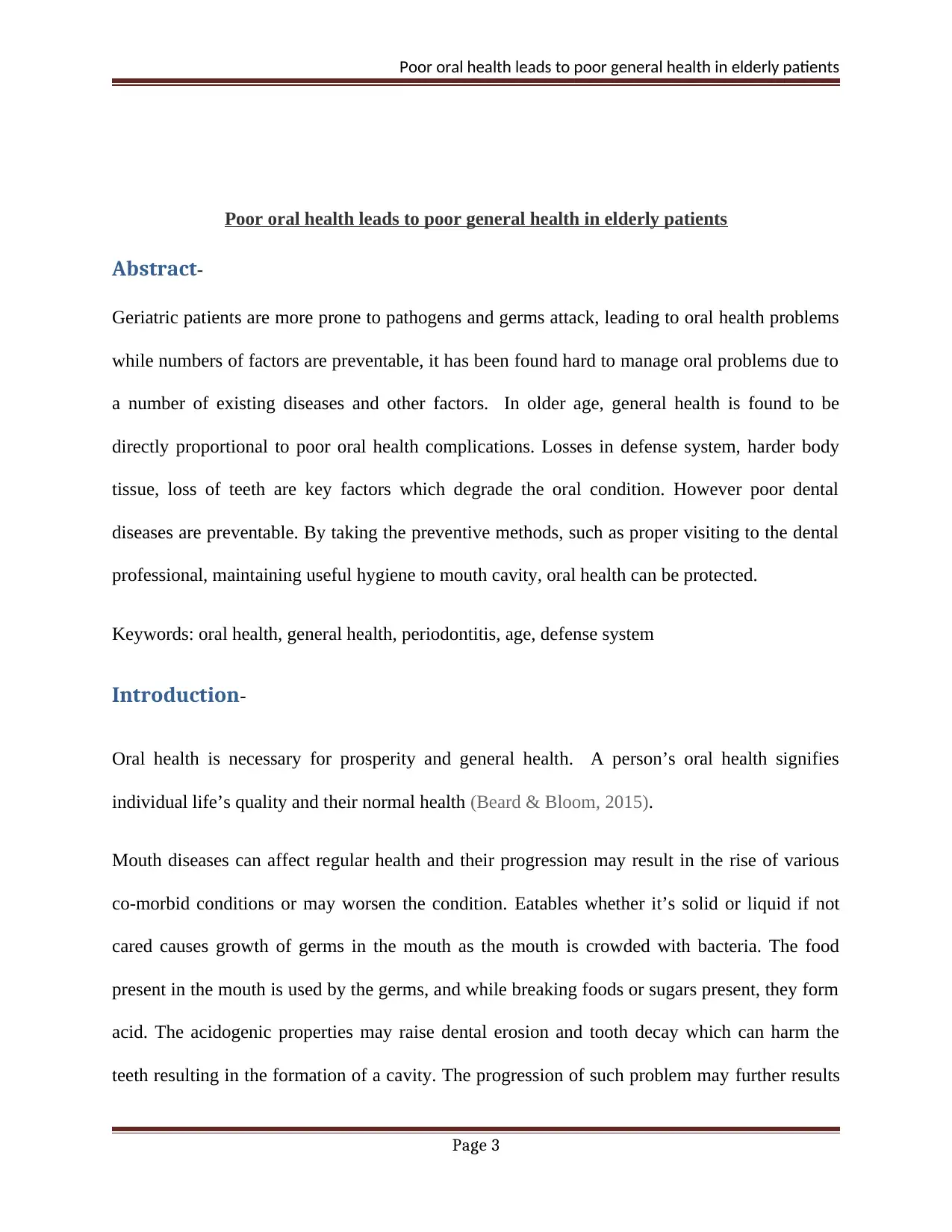
Poor oral health leads to poor general health in elderly patients
Poor oral health leads to poor general health in elderly patients
Abstract-
Geriatric patients are more prone to pathogens and germs attack, leading to oral health problems
while numbers of factors are preventable, it has been found hard to manage oral problems due to
a number of existing diseases and other factors. In older age, general health is found to be
directly proportional to poor oral health complications. Losses in defense system, harder body
tissue, loss of teeth are key factors which degrade the oral condition. However poor dental
diseases are preventable. By taking the preventive methods, such as proper visiting to the dental
professional, maintaining useful hygiene to mouth cavity, oral health can be protected.
Keywords: oral health, general health, periodontitis, age, defense system
Introduction-
Oral health is necessary for prosperity and general health. A person’s oral health signifies
individual life’s quality and their normal health (Beard & Bloom, 2015).
Mouth diseases can affect regular health and their progression may result in the rise of various
co-morbid conditions or may worsen the condition. Eatables whether it’s solid or liquid if not
cared causes growth of germs in the mouth as the mouth is crowded with bacteria. The food
present in the mouth is used by the germs, and while breaking foods or sugars present, they form
acid. The acidogenic properties may raise dental erosion and tooth decay which can harm the
teeth resulting in the formation of a cavity. The progression of such problem may further results
Page 3
Poor oral health leads to poor general health in elderly patients
Abstract-
Geriatric patients are more prone to pathogens and germs attack, leading to oral health problems
while numbers of factors are preventable, it has been found hard to manage oral problems due to
a number of existing diseases and other factors. In older age, general health is found to be
directly proportional to poor oral health complications. Losses in defense system, harder body
tissue, loss of teeth are key factors which degrade the oral condition. However poor dental
diseases are preventable. By taking the preventive methods, such as proper visiting to the dental
professional, maintaining useful hygiene to mouth cavity, oral health can be protected.
Keywords: oral health, general health, periodontitis, age, defense system
Introduction-
Oral health is necessary for prosperity and general health. A person’s oral health signifies
individual life’s quality and their normal health (Beard & Bloom, 2015).
Mouth diseases can affect regular health and their progression may result in the rise of various
co-morbid conditions or may worsen the condition. Eatables whether it’s solid or liquid if not
cared causes growth of germs in the mouth as the mouth is crowded with bacteria. The food
present in the mouth is used by the germs, and while breaking foods or sugars present, they form
acid. The acidogenic properties may raise dental erosion and tooth decay which can harm the
teeth resulting in the formation of a cavity. The progression of such problem may further results
Page 3
⊘ This is a preview!⊘
Do you want full access?
Subscribe today to unlock all pages.

Trusted by 1+ million students worldwide
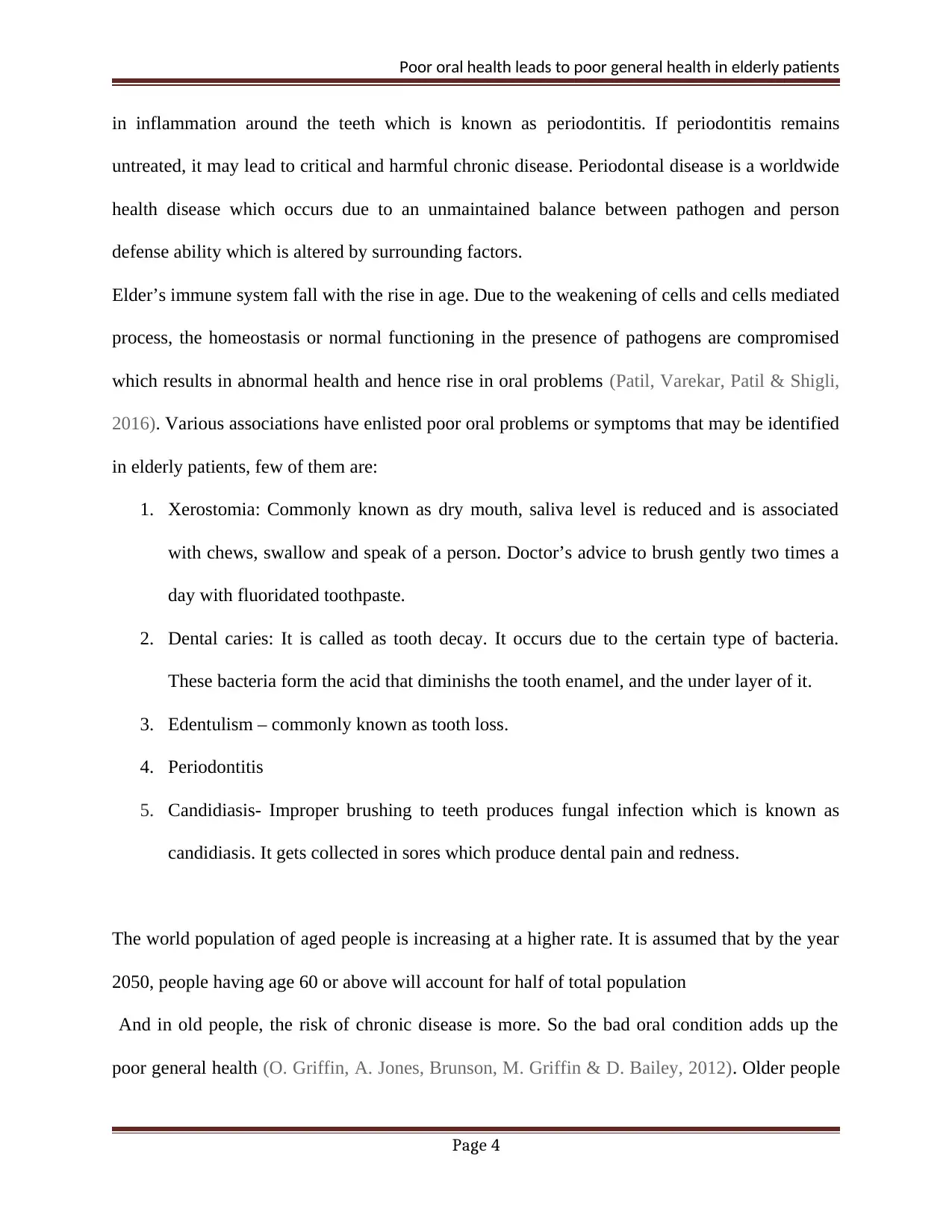
Poor oral health leads to poor general health in elderly patients
in inflammation around the teeth which is known as periodontitis. If periodontitis remains
untreated, it may lead to critical and harmful chronic disease. Periodontal disease is a worldwide
health disease which occurs due to an unmaintained balance between pathogen and person
defense ability which is altered by surrounding factors.
Elder’s immune system fall with the rise in age. Due to the weakening of cells and cells mediated
process, the homeostasis or normal functioning in the presence of pathogens are compromised
which results in abnormal health and hence rise in oral problems (Patil, Varekar, Patil & Shigli,
2016). Various associations have enlisted poor oral problems or symptoms that may be identified
in elderly patients, few of them are:
1. Xerostomia: Commonly known as dry mouth, saliva level is reduced and is associated
with chews, swallow and speak of a person. Doctor’s advice to brush gently two times a
day with fluoridated toothpaste.
2. Dental caries: It is called as tooth decay. It occurs due to the certain type of bacteria.
These bacteria form the acid that diminishs the tooth enamel, and the under layer of it.
3. Edentulism – commonly known as tooth loss.
4. Periodontitis
5. Candidiasis- Improper brushing to teeth produces fungal infection which is known as
candidiasis. It gets collected in sores which produce dental pain and redness.
The world population of aged people is increasing at a higher rate. It is assumed that by the year
2050, people having age 60 or above will account for half of total population
And in old people, the risk of chronic disease is more. So the bad oral condition adds up the
poor general health (O. Griffin, A. Jones, Brunson, M. Griffin & D. Bailey, 2012). Older people
Page 4
in inflammation around the teeth which is known as periodontitis. If periodontitis remains
untreated, it may lead to critical and harmful chronic disease. Periodontal disease is a worldwide
health disease which occurs due to an unmaintained balance between pathogen and person
defense ability which is altered by surrounding factors.
Elder’s immune system fall with the rise in age. Due to the weakening of cells and cells mediated
process, the homeostasis or normal functioning in the presence of pathogens are compromised
which results in abnormal health and hence rise in oral problems (Patil, Varekar, Patil & Shigli,
2016). Various associations have enlisted poor oral problems or symptoms that may be identified
in elderly patients, few of them are:
1. Xerostomia: Commonly known as dry mouth, saliva level is reduced and is associated
with chews, swallow and speak of a person. Doctor’s advice to brush gently two times a
day with fluoridated toothpaste.
2. Dental caries: It is called as tooth decay. It occurs due to the certain type of bacteria.
These bacteria form the acid that diminishs the tooth enamel, and the under layer of it.
3. Edentulism – commonly known as tooth loss.
4. Periodontitis
5. Candidiasis- Improper brushing to teeth produces fungal infection which is known as
candidiasis. It gets collected in sores which produce dental pain and redness.
The world population of aged people is increasing at a higher rate. It is assumed that by the year
2050, people having age 60 or above will account for half of total population
And in old people, the risk of chronic disease is more. So the bad oral condition adds up the
poor general health (O. Griffin, A. Jones, Brunson, M. Griffin & D. Bailey, 2012). Older people
Page 4
Paraphrase This Document
Need a fresh take? Get an instant paraphrase of this document with our AI Paraphraser
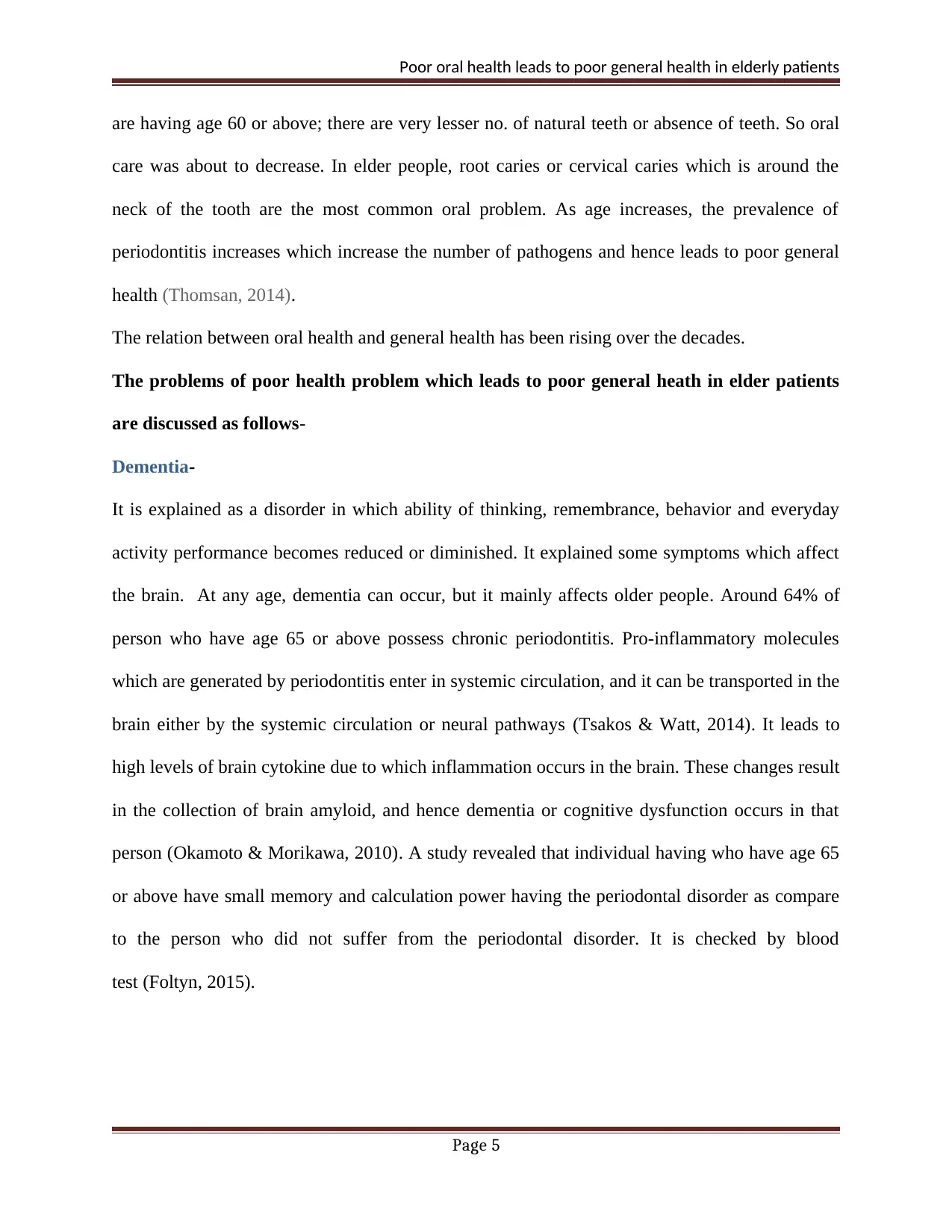
Poor oral health leads to poor general health in elderly patients
are having age 60 or above; there are very lesser no. of natural teeth or absence of teeth. So oral
care was about to decrease. In elder people, root caries or cervical caries which is around the
neck of the tooth are the most common oral problem. As age increases, the prevalence of
periodontitis increases which increase the number of pathogens and hence leads to poor general
health (Thomsan, 2014).
The relation between oral health and general health has been rising over the decades.
The problems of poor health problem which leads to poor general heath in elder patients
are discussed as follows-
Dementia-
It is explained as a disorder in which ability of thinking, remembrance, behavior and everyday
activity performance becomes reduced or diminished. It explained some symptoms which affect
the brain. At any age, dementia can occur, but it mainly affects older people. Around 64% of
person who have age 65 or above possess chronic periodontitis. Pro-inflammatory molecules
which are generated by periodontitis enter in systemic circulation, and it can be transported in the
brain either by the systemic circulation or neural pathways (Tsakos & Watt, 2014). It leads to
high levels of brain cytokine due to which inflammation occurs in the brain. These changes result
in the collection of brain amyloid, and hence dementia or cognitive dysfunction occurs in that
person (Okamoto & Morikawa, 2010). A study revealed that individual having who have age 65
or above have small memory and calculation power having the periodontal disorder as compare
to the person who did not suffer from the periodontal disorder. It is checked by blood
test (Foltyn, 2015).
Page 5
are having age 60 or above; there are very lesser no. of natural teeth or absence of teeth. So oral
care was about to decrease. In elder people, root caries or cervical caries which is around the
neck of the tooth are the most common oral problem. As age increases, the prevalence of
periodontitis increases which increase the number of pathogens and hence leads to poor general
health (Thomsan, 2014).
The relation between oral health and general health has been rising over the decades.
The problems of poor health problem which leads to poor general heath in elder patients
are discussed as follows-
Dementia-
It is explained as a disorder in which ability of thinking, remembrance, behavior and everyday
activity performance becomes reduced or diminished. It explained some symptoms which affect
the brain. At any age, dementia can occur, but it mainly affects older people. Around 64% of
person who have age 65 or above possess chronic periodontitis. Pro-inflammatory molecules
which are generated by periodontitis enter in systemic circulation, and it can be transported in the
brain either by the systemic circulation or neural pathways (Tsakos & Watt, 2014). It leads to
high levels of brain cytokine due to which inflammation occurs in the brain. These changes result
in the collection of brain amyloid, and hence dementia or cognitive dysfunction occurs in that
person (Okamoto & Morikawa, 2010). A study revealed that individual having who have age 65
or above have small memory and calculation power having the periodontal disorder as compare
to the person who did not suffer from the periodontal disorder. It is checked by blood
test (Foltyn, 2015).
Page 5
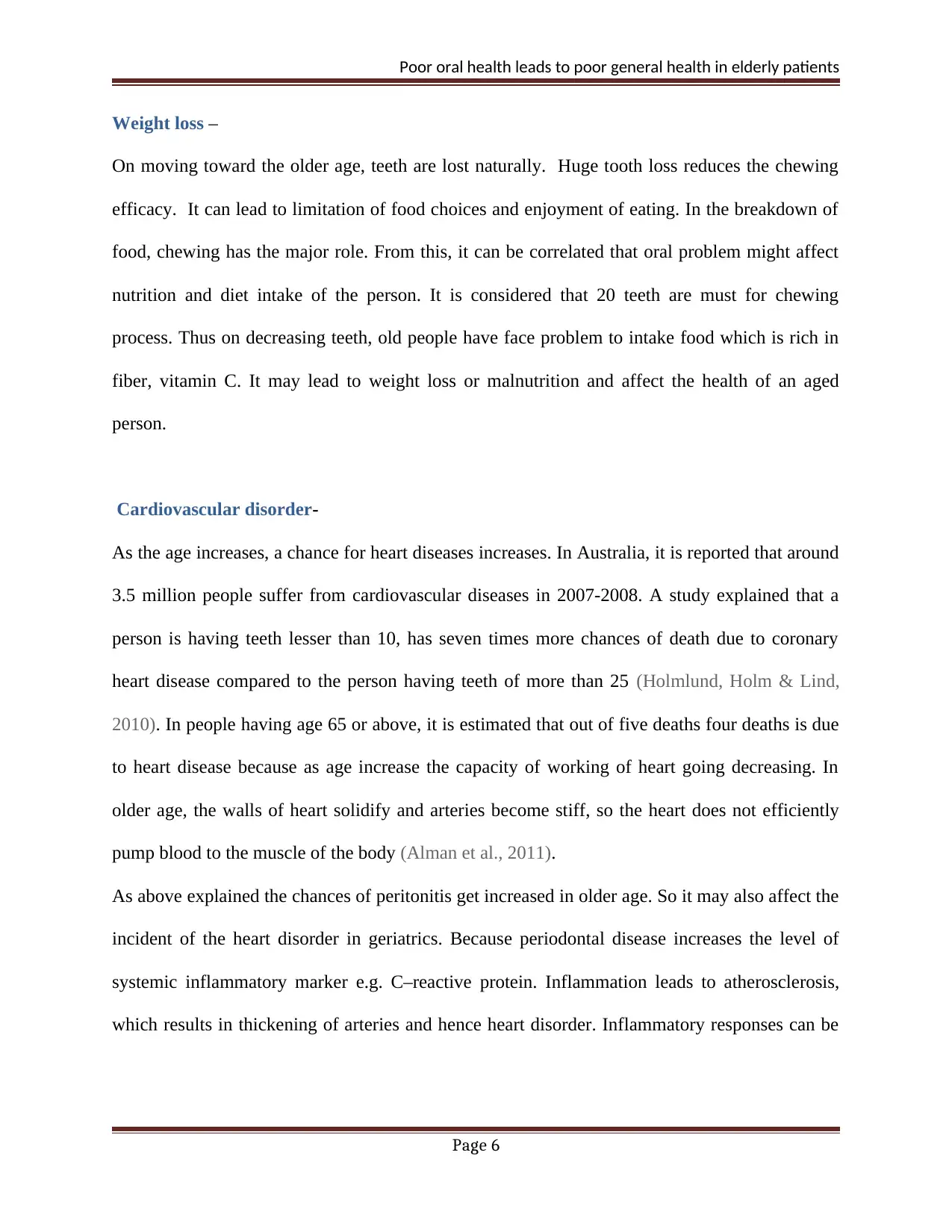
Poor oral health leads to poor general health in elderly patients
Weight loss –
On moving toward the older age, teeth are lost naturally. Huge tooth loss reduces the chewing
efficacy. It can lead to limitation of food choices and enjoyment of eating. In the breakdown of
food, chewing has the major role. From this, it can be correlated that oral problem might affect
nutrition and diet intake of the person. It is considered that 20 teeth are must for chewing
process. Thus on decreasing teeth, old people have face problem to intake food which is rich in
fiber, vitamin C. It may lead to weight loss or malnutrition and affect the health of an aged
person.
Cardiovascular disorder-
As the age increases, a chance for heart diseases increases. In Australia, it is reported that around
3.5 million people suffer from cardiovascular diseases in 2007-2008. A study explained that a
person is having teeth lesser than 10, has seven times more chances of death due to coronary
heart disease compared to the person having teeth of more than 25 (Holmlund, Holm & Lind,
2010). In people having age 65 or above, it is estimated that out of five deaths four deaths is due
to heart disease because as age increase the capacity of working of heart going decreasing. In
older age, the walls of heart solidify and arteries become stiff, so the heart does not efficiently
pump blood to the muscle of the body (Alman et al., 2011).
As above explained the chances of peritonitis get increased in older age. So it may also affect the
incident of the heart disorder in geriatrics. Because periodontal disease increases the level of
systemic inflammatory marker e.g. C–reactive protein. Inflammation leads to atherosclerosis,
which results in thickening of arteries and hence heart disorder. Inflammatory responses can be
Page 6
Weight loss –
On moving toward the older age, teeth are lost naturally. Huge tooth loss reduces the chewing
efficacy. It can lead to limitation of food choices and enjoyment of eating. In the breakdown of
food, chewing has the major role. From this, it can be correlated that oral problem might affect
nutrition and diet intake of the person. It is considered that 20 teeth are must for chewing
process. Thus on decreasing teeth, old people have face problem to intake food which is rich in
fiber, vitamin C. It may lead to weight loss or malnutrition and affect the health of an aged
person.
Cardiovascular disorder-
As the age increases, a chance for heart diseases increases. In Australia, it is reported that around
3.5 million people suffer from cardiovascular diseases in 2007-2008. A study explained that a
person is having teeth lesser than 10, has seven times more chances of death due to coronary
heart disease compared to the person having teeth of more than 25 (Holmlund, Holm & Lind,
2010). In people having age 65 or above, it is estimated that out of five deaths four deaths is due
to heart disease because as age increase the capacity of working of heart going decreasing. In
older age, the walls of heart solidify and arteries become stiff, so the heart does not efficiently
pump blood to the muscle of the body (Alman et al., 2011).
As above explained the chances of peritonitis get increased in older age. So it may also affect the
incident of the heart disorder in geriatrics. Because periodontal disease increases the level of
systemic inflammatory marker e.g. C–reactive protein. Inflammation leads to atherosclerosis,
which results in thickening of arteries and hence heart disorder. Inflammatory responses can be
Page 6
⊘ This is a preview!⊘
Do you want full access?
Subscribe today to unlock all pages.

Trusted by 1+ million students worldwide
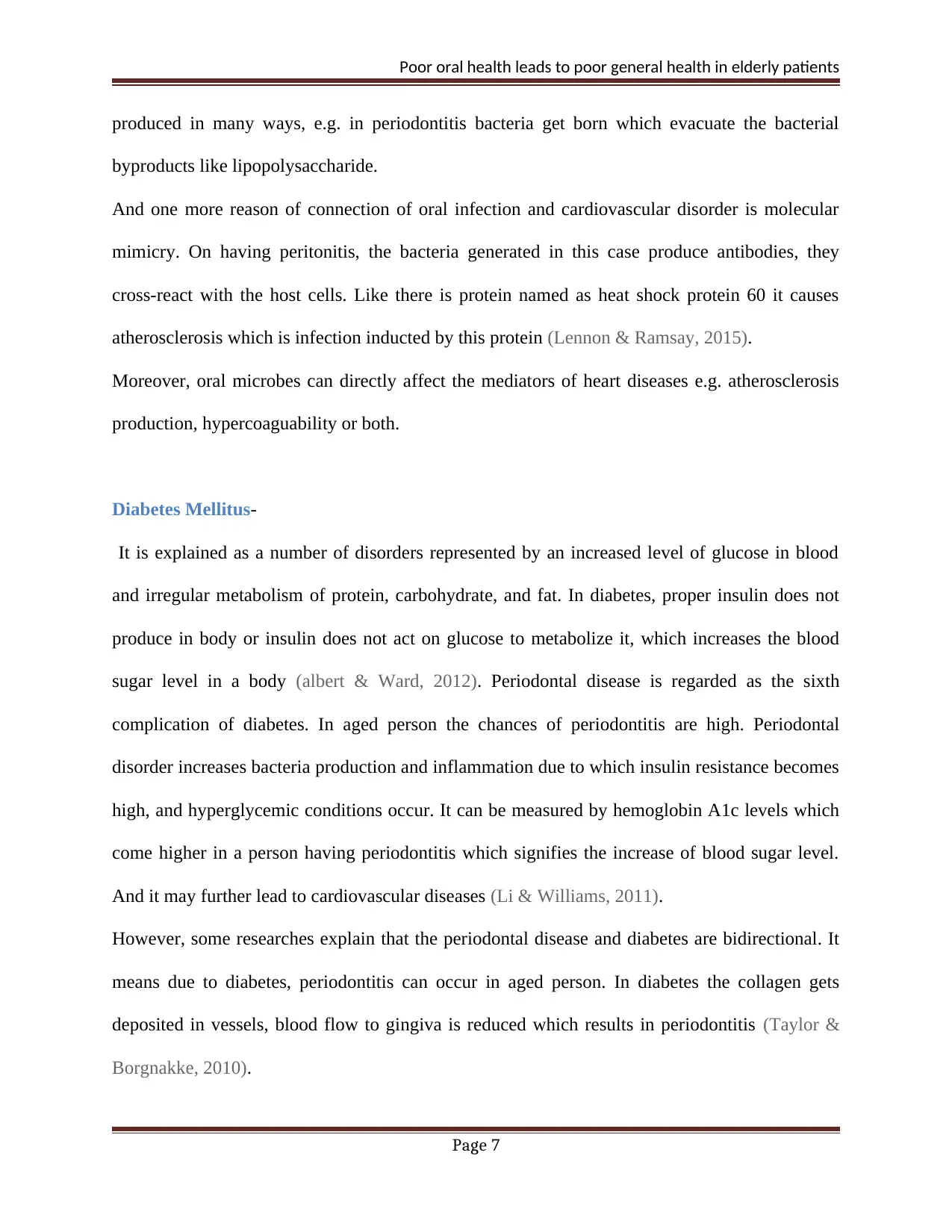
Poor oral health leads to poor general health in elderly patients
produced in many ways, e.g. in periodontitis bacteria get born which evacuate the bacterial
byproducts like lipopolysaccharide.
And one more reason of connection of oral infection and cardiovascular disorder is molecular
mimicry. On having peritonitis, the bacteria generated in this case produce antibodies, they
cross-react with the host cells. Like there is protein named as heat shock protein 60 it causes
atherosclerosis which is infection inducted by this protein (Lennon & Ramsay, 2015).
Moreover, oral microbes can directly affect the mediators of heart diseases e.g. atherosclerosis
production, hypercoaguability or both.
Diabetes Mellitus-
It is explained as a number of disorders represented by an increased level of glucose in blood
and irregular metabolism of protein, carbohydrate, and fat. In diabetes, proper insulin does not
produce in body or insulin does not act on glucose to metabolize it, which increases the blood
sugar level in a body (albert & Ward, 2012). Periodontal disease is regarded as the sixth
complication of diabetes. In aged person the chances of periodontitis are high. Periodontal
disorder increases bacteria production and inflammation due to which insulin resistance becomes
high, and hyperglycemic conditions occur. It can be measured by hemoglobin A1c levels which
come higher in a person having periodontitis which signifies the increase of blood sugar level.
And it may further lead to cardiovascular diseases (Li & Williams, 2011).
However, some researches explain that the periodontal disease and diabetes are bidirectional. It
means due to diabetes, periodontitis can occur in aged person. In diabetes the collagen gets
deposited in vessels, blood flow to gingiva is reduced which results in periodontitis (Taylor &
Borgnakke, 2010).
Page 7
produced in many ways, e.g. in periodontitis bacteria get born which evacuate the bacterial
byproducts like lipopolysaccharide.
And one more reason of connection of oral infection and cardiovascular disorder is molecular
mimicry. On having peritonitis, the bacteria generated in this case produce antibodies, they
cross-react with the host cells. Like there is protein named as heat shock protein 60 it causes
atherosclerosis which is infection inducted by this protein (Lennon & Ramsay, 2015).
Moreover, oral microbes can directly affect the mediators of heart diseases e.g. atherosclerosis
production, hypercoaguability or both.
Diabetes Mellitus-
It is explained as a number of disorders represented by an increased level of glucose in blood
and irregular metabolism of protein, carbohydrate, and fat. In diabetes, proper insulin does not
produce in body or insulin does not act on glucose to metabolize it, which increases the blood
sugar level in a body (albert & Ward, 2012). Periodontal disease is regarded as the sixth
complication of diabetes. In aged person the chances of periodontitis are high. Periodontal
disorder increases bacteria production and inflammation due to which insulin resistance becomes
high, and hyperglycemic conditions occur. It can be measured by hemoglobin A1c levels which
come higher in a person having periodontitis which signifies the increase of blood sugar level.
And it may further lead to cardiovascular diseases (Li & Williams, 2011).
However, some researches explain that the periodontal disease and diabetes are bidirectional. It
means due to diabetes, periodontitis can occur in aged person. In diabetes the collagen gets
deposited in vessels, blood flow to gingiva is reduced which results in periodontitis (Taylor &
Borgnakke, 2010).
Page 7
Paraphrase This Document
Need a fresh take? Get an instant paraphrase of this document with our AI Paraphraser
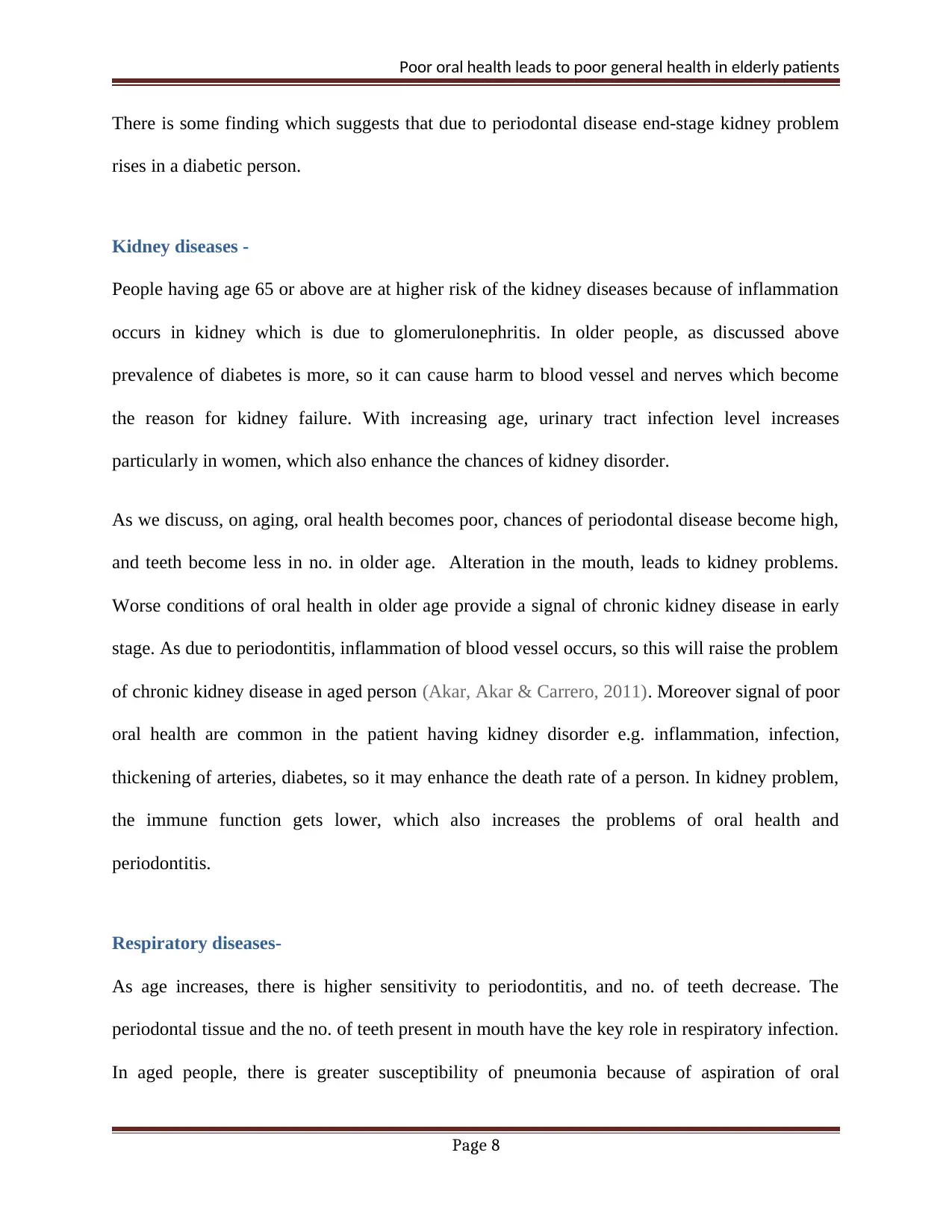
Poor oral health leads to poor general health in elderly patients
There is some finding which suggests that due to periodontal disease end-stage kidney problem
rises in a diabetic person.
Kidney diseases -
People having age 65 or above are at higher risk of the kidney diseases because of inflammation
occurs in kidney which is due to glomerulonephritis. In older people, as discussed above
prevalence of diabetes is more, so it can cause harm to blood vessel and nerves which become
the reason for kidney failure. With increasing age, urinary tract infection level increases
particularly in women, which also enhance the chances of kidney disorder.
As we discuss, on aging, oral health becomes poor, chances of periodontal disease become high,
and teeth become less in no. in older age. Alteration in the mouth, leads to kidney problems.
Worse conditions of oral health in older age provide a signal of chronic kidney disease in early
stage. As due to periodontitis, inflammation of blood vessel occurs, so this will raise the problem
of chronic kidney disease in aged person (Akar, Akar & Carrero, 2011). Moreover signal of poor
oral health are common in the patient having kidney disorder e.g. inflammation, infection,
thickening of arteries, diabetes, so it may enhance the death rate of a person. In kidney problem,
the immune function gets lower, which also increases the problems of oral health and
periodontitis.
Respiratory diseases-
As age increases, there is higher sensitivity to periodontitis, and no. of teeth decrease. The
periodontal tissue and the no. of teeth present in mouth have the key role in respiratory infection.
In aged people, there is greater susceptibility of pneumonia because of aspiration of oral
Page 8
There is some finding which suggests that due to periodontal disease end-stage kidney problem
rises in a diabetic person.
Kidney diseases -
People having age 65 or above are at higher risk of the kidney diseases because of inflammation
occurs in kidney which is due to glomerulonephritis. In older people, as discussed above
prevalence of diabetes is more, so it can cause harm to blood vessel and nerves which become
the reason for kidney failure. With increasing age, urinary tract infection level increases
particularly in women, which also enhance the chances of kidney disorder.
As we discuss, on aging, oral health becomes poor, chances of periodontal disease become high,
and teeth become less in no. in older age. Alteration in the mouth, leads to kidney problems.
Worse conditions of oral health in older age provide a signal of chronic kidney disease in early
stage. As due to periodontitis, inflammation of blood vessel occurs, so this will raise the problem
of chronic kidney disease in aged person (Akar, Akar & Carrero, 2011). Moreover signal of poor
oral health are common in the patient having kidney disorder e.g. inflammation, infection,
thickening of arteries, diabetes, so it may enhance the death rate of a person. In kidney problem,
the immune function gets lower, which also increases the problems of oral health and
periodontitis.
Respiratory diseases-
As age increases, there is higher sensitivity to periodontitis, and no. of teeth decrease. The
periodontal tissue and the no. of teeth present in mouth have the key role in respiratory infection.
In aged people, there is greater susceptibility of pneumonia because of aspiration of oral
Page 8
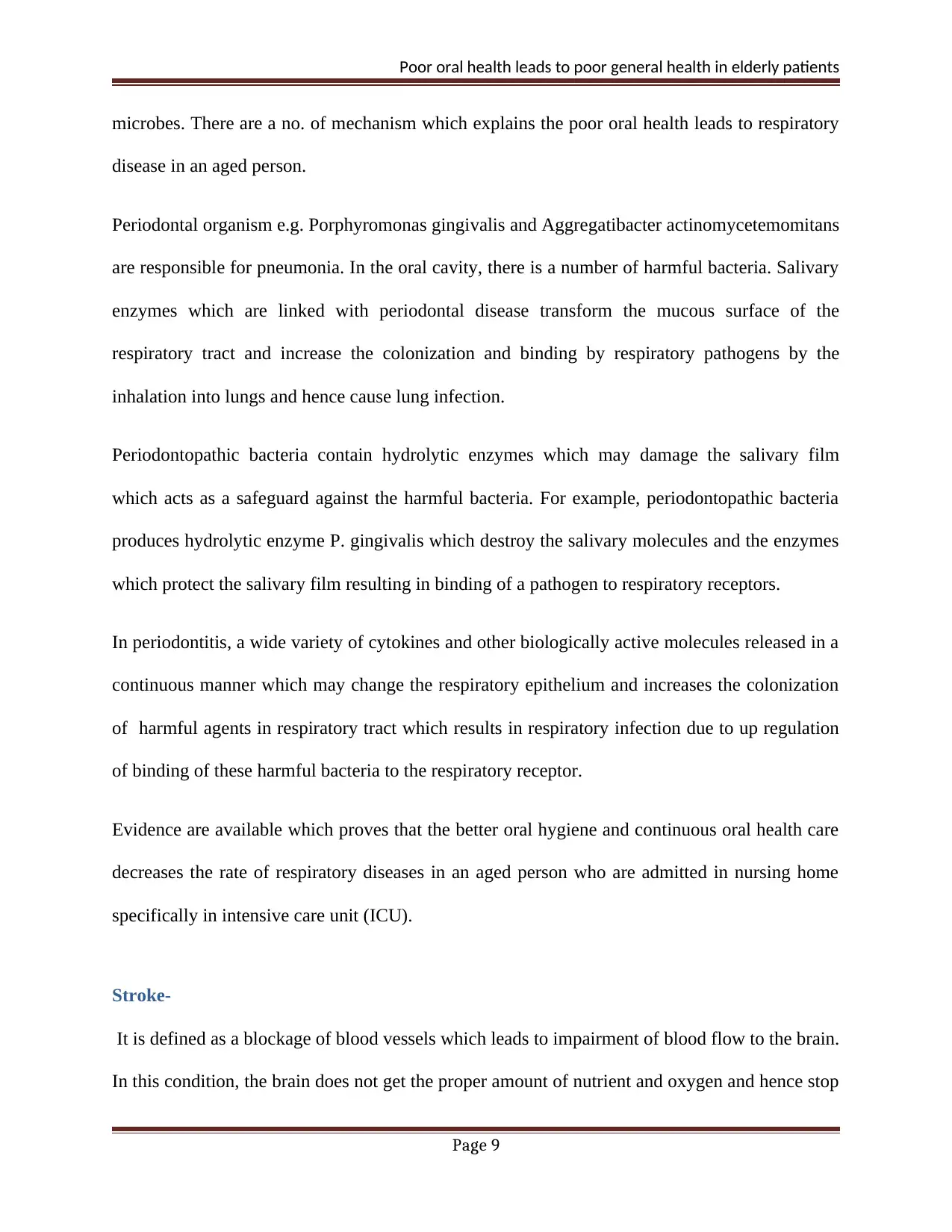
Poor oral health leads to poor general health in elderly patients
microbes. There are a no. of mechanism which explains the poor oral health leads to respiratory
disease in an aged person.
Periodontal organism e.g. Porphyromonas gingivalis and Aggregatibacter actinomycetemomitans
are responsible for pneumonia. In the oral cavity, there is a number of harmful bacteria. Salivary
enzymes which are linked with periodontal disease transform the mucous surface of the
respiratory tract and increase the colonization and binding by respiratory pathogens by the
inhalation into lungs and hence cause lung infection.
Periodontopathic bacteria contain hydrolytic enzymes which may damage the salivary film
which acts as a safeguard against the harmful bacteria. For example, periodontopathic bacteria
produces hydrolytic enzyme P. gingivalis which destroy the salivary molecules and the enzymes
which protect the salivary film resulting in binding of a pathogen to respiratory receptors.
In periodontitis, a wide variety of cytokines and other biologically active molecules released in a
continuous manner which may change the respiratory epithelium and increases the colonization
of harmful agents in respiratory tract which results in respiratory infection due to up regulation
of binding of these harmful bacteria to the respiratory receptor.
Evidence are available which proves that the better oral hygiene and continuous oral health care
decreases the rate of respiratory diseases in an aged person who are admitted in nursing home
specifically in intensive care unit (ICU).
Stroke-
It is defined as a blockage of blood vessels which leads to impairment of blood flow to the brain.
In this condition, the brain does not get the proper amount of nutrient and oxygen and hence stop
Page 9
microbes. There are a no. of mechanism which explains the poor oral health leads to respiratory
disease in an aged person.
Periodontal organism e.g. Porphyromonas gingivalis and Aggregatibacter actinomycetemomitans
are responsible for pneumonia. In the oral cavity, there is a number of harmful bacteria. Salivary
enzymes which are linked with periodontal disease transform the mucous surface of the
respiratory tract and increase the colonization and binding by respiratory pathogens by the
inhalation into lungs and hence cause lung infection.
Periodontopathic bacteria contain hydrolytic enzymes which may damage the salivary film
which acts as a safeguard against the harmful bacteria. For example, periodontopathic bacteria
produces hydrolytic enzyme P. gingivalis which destroy the salivary molecules and the enzymes
which protect the salivary film resulting in binding of a pathogen to respiratory receptors.
In periodontitis, a wide variety of cytokines and other biologically active molecules released in a
continuous manner which may change the respiratory epithelium and increases the colonization
of harmful agents in respiratory tract which results in respiratory infection due to up regulation
of binding of these harmful bacteria to the respiratory receptor.
Evidence are available which proves that the better oral hygiene and continuous oral health care
decreases the rate of respiratory diseases in an aged person who are admitted in nursing home
specifically in intensive care unit (ICU).
Stroke-
It is defined as a blockage of blood vessels which leads to impairment of blood flow to the brain.
In this condition, the brain does not get the proper amount of nutrient and oxygen and hence stop
Page 9
⊘ This is a preview!⊘
Do you want full access?
Subscribe today to unlock all pages.

Trusted by 1+ million students worldwide
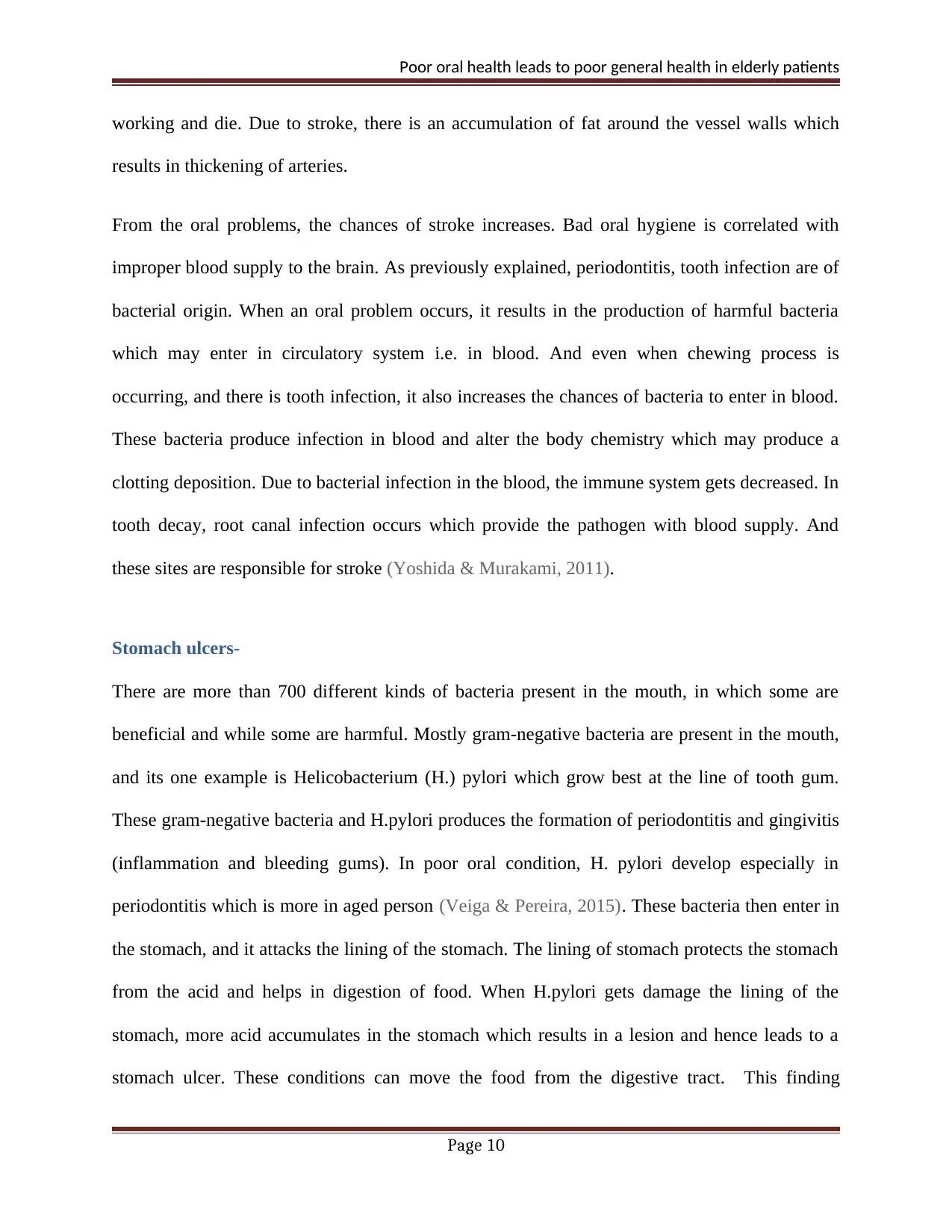
Poor oral health leads to poor general health in elderly patients
working and die. Due to stroke, there is an accumulation of fat around the vessel walls which
results in thickening of arteries.
From the oral problems, the chances of stroke increases. Bad oral hygiene is correlated with
improper blood supply to the brain. As previously explained, periodontitis, tooth infection are of
bacterial origin. When an oral problem occurs, it results in the production of harmful bacteria
which may enter in circulatory system i.e. in blood. And even when chewing process is
occurring, and there is tooth infection, it also increases the chances of bacteria to enter in blood.
These bacteria produce infection in blood and alter the body chemistry which may produce a
clotting deposition. Due to bacterial infection in the blood, the immune system gets decreased. In
tooth decay, root canal infection occurs which provide the pathogen with blood supply. And
these sites are responsible for stroke (Yoshida & Murakami, 2011).
Stomach ulcers-
There are more than 700 different kinds of bacteria present in the mouth, in which some are
beneficial and while some are harmful. Mostly gram-negative bacteria are present in the mouth,
and its one example is Helicobacterium (H.) pylori which grow best at the line of tooth gum.
These gram-negative bacteria and H.pylori produces the formation of periodontitis and gingivitis
(inflammation and bleeding gums). In poor oral condition, H. pylori develop especially in
periodontitis which is more in aged person (Veiga & Pereira, 2015). These bacteria then enter in
the stomach, and it attacks the lining of the stomach. The lining of stomach protects the stomach
from the acid and helps in digestion of food. When H.pylori gets damage the lining of the
stomach, more acid accumulates in the stomach which results in a lesion and hence leads to a
stomach ulcer. These conditions can move the food from the digestive tract. This finding
Page 10
working and die. Due to stroke, there is an accumulation of fat around the vessel walls which
results in thickening of arteries.
From the oral problems, the chances of stroke increases. Bad oral hygiene is correlated with
improper blood supply to the brain. As previously explained, periodontitis, tooth infection are of
bacterial origin. When an oral problem occurs, it results in the production of harmful bacteria
which may enter in circulatory system i.e. in blood. And even when chewing process is
occurring, and there is tooth infection, it also increases the chances of bacteria to enter in blood.
These bacteria produce infection in blood and alter the body chemistry which may produce a
clotting deposition. Due to bacterial infection in the blood, the immune system gets decreased. In
tooth decay, root canal infection occurs which provide the pathogen with blood supply. And
these sites are responsible for stroke (Yoshida & Murakami, 2011).
Stomach ulcers-
There are more than 700 different kinds of bacteria present in the mouth, in which some are
beneficial and while some are harmful. Mostly gram-negative bacteria are present in the mouth,
and its one example is Helicobacterium (H.) pylori which grow best at the line of tooth gum.
These gram-negative bacteria and H.pylori produces the formation of periodontitis and gingivitis
(inflammation and bleeding gums). In poor oral condition, H. pylori develop especially in
periodontitis which is more in aged person (Veiga & Pereira, 2015). These bacteria then enter in
the stomach, and it attacks the lining of the stomach. The lining of stomach protects the stomach
from the acid and helps in digestion of food. When H.pylori gets damage the lining of the
stomach, more acid accumulates in the stomach which results in a lesion and hence leads to a
stomach ulcer. These conditions can move the food from the digestive tract. This finding
Page 10
Paraphrase This Document
Need a fresh take? Get an instant paraphrase of this document with our AI Paraphraser
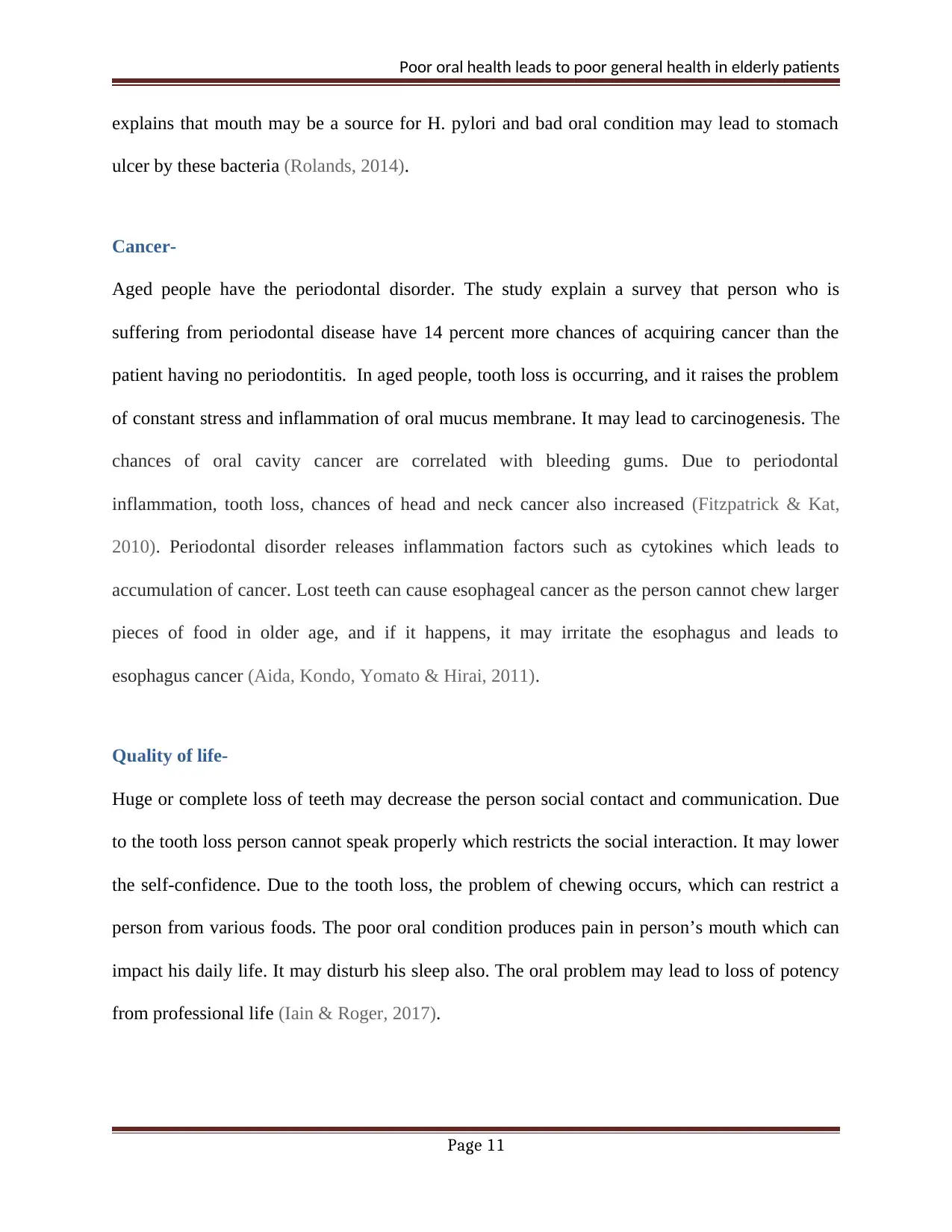
Poor oral health leads to poor general health in elderly patients
explains that mouth may be a source for H. pylori and bad oral condition may lead to stomach
ulcer by these bacteria (Rolands, 2014).
Cancer-
Aged people have the periodontal disorder. The study explain a survey that person who is
suffering from periodontal disease have 14 percent more chances of acquiring cancer than the
patient having no periodontitis. In aged people, tooth loss is occurring, and it raises the problem
of constant stress and inflammation of oral mucus membrane. It may lead to carcinogenesis. The
chances of oral cavity cancer are correlated with bleeding gums. Due to periodontal
inflammation, tooth loss, chances of head and neck cancer also increased (Fitzpatrick & Kat,
2010). Periodontal disorder releases inflammation factors such as cytokines which leads to
accumulation of cancer. Lost teeth can cause esophageal cancer as the person cannot chew larger
pieces of food in older age, and if it happens, it may irritate the esophagus and leads to
esophagus cancer (Aida, Kondo, Yomato & Hirai, 2011).
Quality of life-
Huge or complete loss of teeth may decrease the person social contact and communication. Due
to the tooth loss person cannot speak properly which restricts the social interaction. It may lower
the self-confidence. Due to the tooth loss, the problem of chewing occurs, which can restrict a
person from various foods. The poor oral condition produces pain in person’s mouth which can
impact his daily life. It may disturb his sleep also. The oral problem may lead to loss of potency
from professional life (Iain & Roger, 2017).
Page 11
explains that mouth may be a source for H. pylori and bad oral condition may lead to stomach
ulcer by these bacteria (Rolands, 2014).
Cancer-
Aged people have the periodontal disorder. The study explain a survey that person who is
suffering from periodontal disease have 14 percent more chances of acquiring cancer than the
patient having no periodontitis. In aged people, tooth loss is occurring, and it raises the problem
of constant stress and inflammation of oral mucus membrane. It may lead to carcinogenesis. The
chances of oral cavity cancer are correlated with bleeding gums. Due to periodontal
inflammation, tooth loss, chances of head and neck cancer also increased (Fitzpatrick & Kat,
2010). Periodontal disorder releases inflammation factors such as cytokines which leads to
accumulation of cancer. Lost teeth can cause esophageal cancer as the person cannot chew larger
pieces of food in older age, and if it happens, it may irritate the esophagus and leads to
esophagus cancer (Aida, Kondo, Yomato & Hirai, 2011).
Quality of life-
Huge or complete loss of teeth may decrease the person social contact and communication. Due
to the tooth loss person cannot speak properly which restricts the social interaction. It may lower
the self-confidence. Due to the tooth loss, the problem of chewing occurs, which can restrict a
person from various foods. The poor oral condition produces pain in person’s mouth which can
impact his daily life. It may disturb his sleep also. The oral problem may lead to loss of potency
from professional life (Iain & Roger, 2017).
Page 11
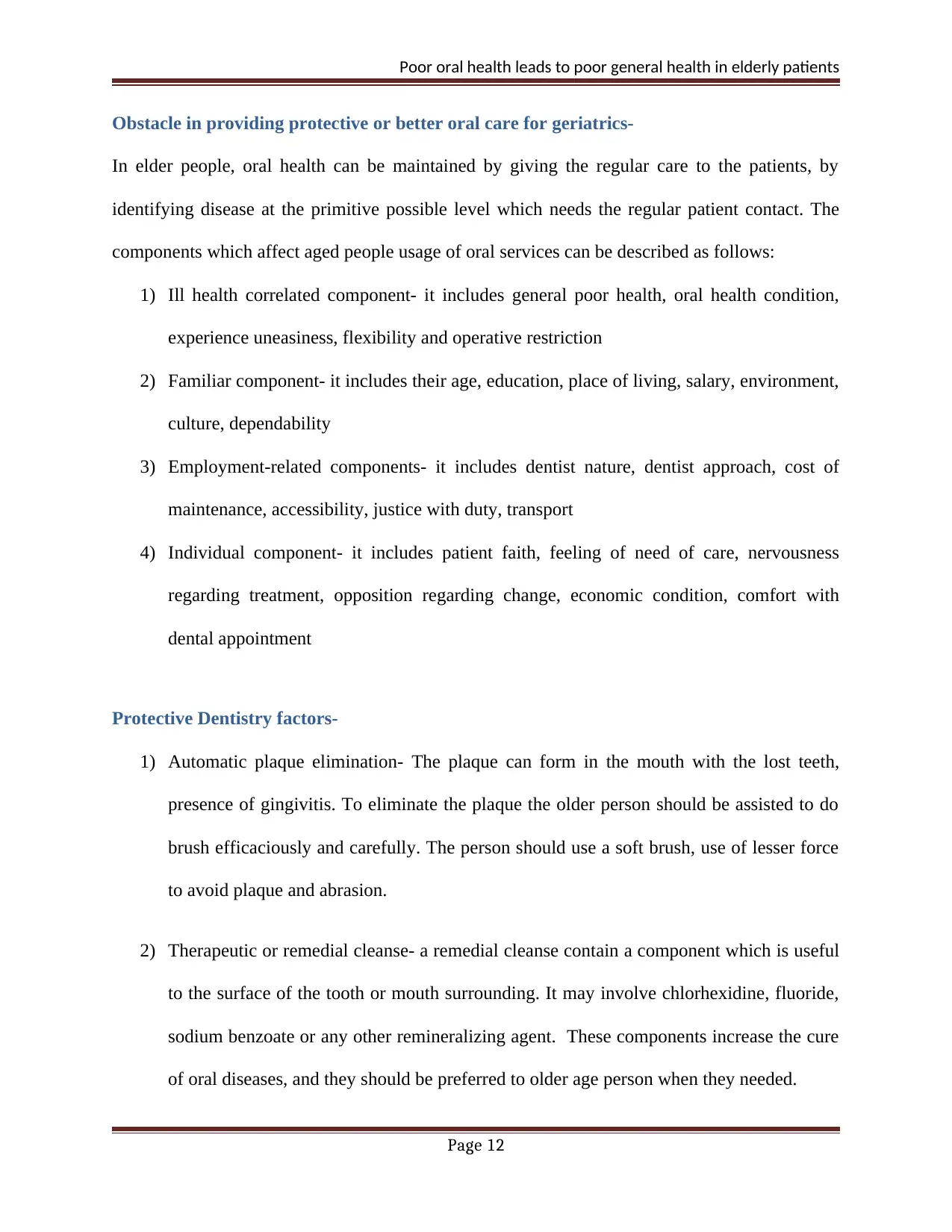
Poor oral health leads to poor general health in elderly patients
Obstacle in providing protective or better oral care for geriatrics-
In elder people, oral health can be maintained by giving the regular care to the patients, by
identifying disease at the primitive possible level which needs the regular patient contact. The
components which affect aged people usage of oral services can be described as follows:
1) Ill health correlated component- it includes general poor health, oral health condition,
experience uneasiness, flexibility and operative restriction
2) Familiar component- it includes their age, education, place of living, salary, environment,
culture, dependability
3) Employment-related components- it includes dentist nature, dentist approach, cost of
maintenance, accessibility, justice with duty, transport
4) Individual component- it includes patient faith, feeling of need of care, nervousness
regarding treatment, opposition regarding change, economic condition, comfort with
dental appointment
Protective Dentistry factors-
1) Automatic plaque elimination- The plaque can form in the mouth with the lost teeth,
presence of gingivitis. To eliminate the plaque the older person should be assisted to do
brush efficaciously and carefully. The person should use a soft brush, use of lesser force
to avoid plaque and abrasion.
2) Therapeutic or remedial cleanse- a remedial cleanse contain a component which is useful
to the surface of the tooth or mouth surrounding. It may involve chlorhexidine, fluoride,
sodium benzoate or any other remineralizing agent. These components increase the cure
of oral diseases, and they should be preferred to older age person when they needed.
Page 12
Obstacle in providing protective or better oral care for geriatrics-
In elder people, oral health can be maintained by giving the regular care to the patients, by
identifying disease at the primitive possible level which needs the regular patient contact. The
components which affect aged people usage of oral services can be described as follows:
1) Ill health correlated component- it includes general poor health, oral health condition,
experience uneasiness, flexibility and operative restriction
2) Familiar component- it includes their age, education, place of living, salary, environment,
culture, dependability
3) Employment-related components- it includes dentist nature, dentist approach, cost of
maintenance, accessibility, justice with duty, transport
4) Individual component- it includes patient faith, feeling of need of care, nervousness
regarding treatment, opposition regarding change, economic condition, comfort with
dental appointment
Protective Dentistry factors-
1) Automatic plaque elimination- The plaque can form in the mouth with the lost teeth,
presence of gingivitis. To eliminate the plaque the older person should be assisted to do
brush efficaciously and carefully. The person should use a soft brush, use of lesser force
to avoid plaque and abrasion.
2) Therapeutic or remedial cleanse- a remedial cleanse contain a component which is useful
to the surface of the tooth or mouth surrounding. It may involve chlorhexidine, fluoride,
sodium benzoate or any other remineralizing agent. These components increase the cure
of oral diseases, and they should be preferred to older age person when they needed.
Page 12
⊘ This is a preview!⊘
Do you want full access?
Subscribe today to unlock all pages.

Trusted by 1+ million students worldwide
1 out of 18
Related Documents
Your All-in-One AI-Powered Toolkit for Academic Success.
+13062052269
info@desklib.com
Available 24*7 on WhatsApp / Email
![[object Object]](/_next/static/media/star-bottom.7253800d.svg)
Unlock your academic potential
Copyright © 2020–2025 A2Z Services. All Rights Reserved. Developed and managed by ZUCOL.





